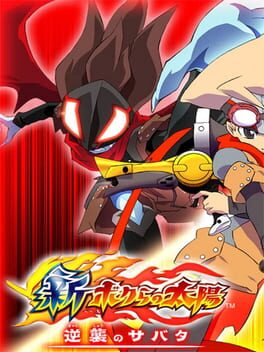

The legend goes that the Warriors were betrayed by their friend and never even fought the Eternal Beast. Django has to climb the Ancient Tree. At the top is Wings of Death, Hresvelgr, the second Immortal, who has captured Trinity and uses him as a bait to lure Django, as well as sucking power away from the tree. While keeping Trinity out of harm's way, Django defeats Hresvelgr, taking the coffin back to the Piledriver and successfully purifies him. However, as Django tries to return to San Miguel, The Count reappears, and challenges Django. Trinity freaks out and runs. Clouds cover the sky, and Dark Matter starts to rain down on Django. Trinity realizes that The Legend of The Warriors of Light is a true story: about Django. He believes that Django dies and the world ends because he "betrayed" Django. Django journeys to Pirate Island, where he learns more about Carmilla, and about what happened. Django defeats Machine King Nidhoggr, the Immortal charged with preventing Django from making it into space, and Piledrives him. Having a usable ship, Django heads back to the place where they fought. The Solar Boy enters a cannon and is fired into space, landing at the Dark Castle. Django finds Carmilla before the last level and after talking, he decides to do all he can to save the world, even if that means losing his brother. Making it to the core, Django fights against Vanargand (and Sabata). After a long, arduous battle, Django defeats the creature. A pseudo bike battle then occurs. As Django makes it out into the sunlight, Otenko or Sabata (on his own bike) is freed from Vanargand. As they reach the end of the road, Django and Otenko or Sabata combine their powers and finish Vanargand.
Reviews View More
os três jogos são cheios desses momentos de hiperrealidade. o que os difere de qualquer experimento moderno de realidade aumentada em que aparece um pokémon no seu quarto é o vetor. não é o jogo que está vazando no nosso mundo - é o nosso mundo que está vazando pra dentro dele. pequenas coisas que para os personagens não seriam explicadas dentro da ficção (p: por que o sol ficou mais fraco logo agora que eu preciso que ele fique mais fraco pois essa área tem vento que me atrapalha dependendo da intensidade da luz solar? r: pois deus existe e me abençoou, r2: pois eu cobri a fita do meu gba e fiz sombra, r3: porque eu diminuí a luz do sol mudando uma opção no emulador) são manipuladas por um mundo que eles não habitam, entendem ou tocam. a fé que ele tem no que existe dentro de si mesmo é tamanha que só pode inspirar. se sua mensagem final é que, é claro, o futuro depende de nós (como todos os jogos da kojipro) e das nossas pequenas ações diárias e iterativas, a força da mensagem é ainda mais intensa visto que ele mesmo depende dessas pequenas ações de nossa parte que fazem toda a diferença na dificuldade e na verdade que eles enfrentam lá dentro.
a estética faroeste-gótica com todas as cores mais lindas que existem em um mundo que está em estado terminal e precisa demonstrar que a esperança não vem do quão legal era mas do quão legal *é* porque o mundo que temos para restaurar é o do presente casa muito bem com uma história de iconoclastia que é simultaneamente avassaladora e reverente, sendo nostálgica de coisas que estão aqui, ainda, só pensando em quando elas não vão estar mais.
umas semanas atrás eu sonhei que alguém importante me dizia pra jogar esse jogo, e eu resolvi acatar porque não pensava em boktai há anos. erro meu! acredito agora, sem muitas ressalvas, que esse é o melhor jogo do mundo. mas mesmo se não for, fico imaginando quais foram as respostas dele pra essas pequenas vazadas tecnognósticas que ele insiste em ficar fazendo em outras realidades. presumo que seja r mesmo.
It's true that Hideo Kojima's influence on Boktai has been overstated, but the further away the series drifts from its charming and clever first installment the more I feel that this series really could've used the master's touch. Then again, I suppose he was busy at the time with Metal Gear Solid 3, one of the greatest games ever made, so I can't be too upset, but it makes me wonder what could've been.
